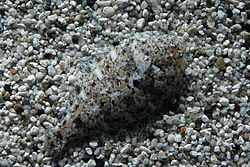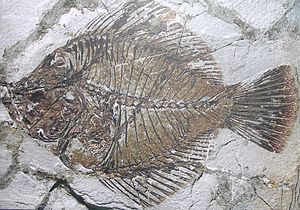Flatfish facts for kids
Quick facts for kids Flatfish |
|
|---|---|
 |
|
| Flatfish (Peces Planos) | |
| Scientific classification | |
| Kingdom: | |
| Phylum: | |
| Class: | |
| Infraclass: | |
| Order: |
Pleuronectiformes (Flatfish)
|
| Families | |
|
Suborder Psettodoidei |
|
Flatfish are a special kind of fish that look very flat. There are many different types, like flounder, sole, turbot, plaice, and halibut. People often catch these fish to eat.
All flatfish are quite flat and have fin rays. They swim on their side, not upright like most fish. This flat shape helps them hide on the ocean floor. They can wait there for other small animals to swim by, which they then catch for food.
Flatfish are amazing at camouflage. This means they can change their skin color very quickly. They do this to blend in perfectly with the sand or rocks around them. This helps them hide from both predators and prey.
| Top - 0-9 A B C D E F G H I J K L M N O P Q R S T U V W X Y Z |
What Makes Flatfish Special?
Flatfish have a very unique body shape. Their main adaptation is having both eyes on one side of their head. This is perfect for living on the seabed, also known as the benthos.
They can even stick their eyes up a little bit. This helps them see around without lifting their whole body off the bottom. Some flatfish have both eyes on the left side of their head, like the turbot. Others have both eyes on the right side, like the halibut and sole.
How Flatfish Evolved
The flatfish body shape didn't just appear once. Instead, different groups of fish developed this flat shape over a long time. This means they share similar features because they adapted to the same way of life.
When flatfish are born, they look like normal fish. They have one eye on each side of their head, just like most fish. But as they grow, they go through a big change called metamorphosis. During this change, one eye actually moves across their head to join the other eye! This makes them look very unique.
Scientists like Charles Darwin thought that this eye movement happened slowly over many generations. Recent discoveries of fossils support this idea.
Ancient Flatfish Fossils
Scientists found two fossil fish from about 50 million years ago. These fossils show how flatfish slowly got their unique shape. One fossil is called Amphistium. In Amphistium, the change wasn't complete. One eye was still near the top-center of its head, not fully moved to the other side.
These fossils show that the change happened step-by-step. The fish with partially moved eyes lived for a long time. This means they were not at a disadvantage. Eventually, the flatfish with fully moved eyes became more common. This is a great example of natural selection at work. It shows how animals adapt over time to fit their environment.
Images for kids
-
The European plaice is a very important commercial flatfish in Europe.
-
Halibut are the largest of the flatfishes, and are caught for food.
-
The turbot is a large flatfish with left-sided eyes. It lives in sandy coastal waters around Europe.
See also
 In Spanish: Pleuronectiformes para niños
In Spanish: Pleuronectiformes para niños
 | Mary Eliza Mahoney |
 | Susie King Taylor |
 | Ida Gray |
 | Eliza Ann Grier |








